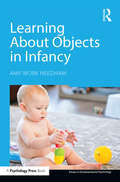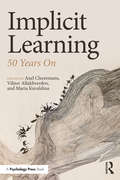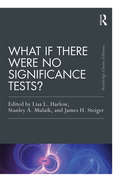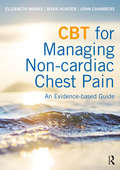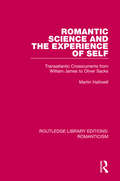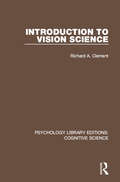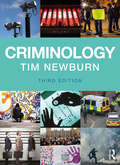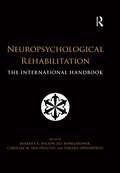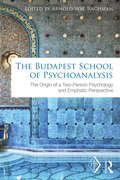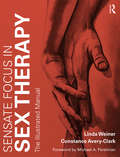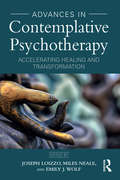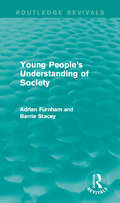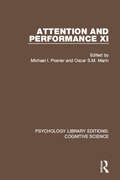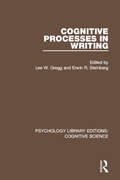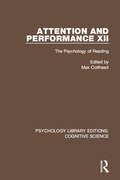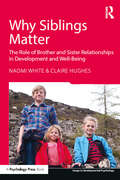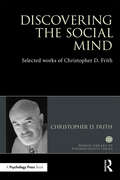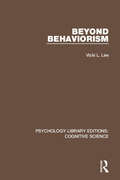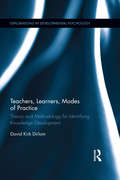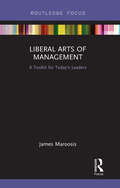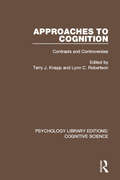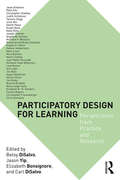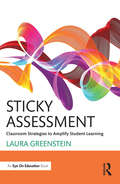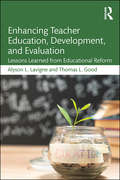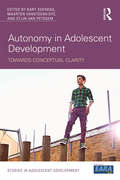- Table View
- List View
Learning About Objects in Infancy (Essays in Developmental Psychology)
by Amy Work NeedhamHow do young infants experience the world around them? How similar or different are infants’ experiences from adults’ experiences of similar situations? How do infants progress from relatively sparse knowledge and expectations early in life to much more elaborate knowledge and expectations just several months later? We know that much of infants’ learning before four to five months of age is visually-based. As they develop the ability to reach for objects independently, they can explore objects that are of particular interest to them—a new skill that must be important for their learning. Through this transition to independent reaching and exploration, infants go a long way toward forming their own understandings of the objects around them. Towards the end of the first year of life, infants begin manipulating one object relative to another and this skill sets the stage for them to begin using objects instrumentally—using one object to create changes in other objects. This new ability opens up many opportunities for infants to learn about using tools. In this volume, Amy Work Needham provides an extensive overview of her research on infant learning, with a particular focus on how infants learn about objects. She begins with an explanation of how basic aspects of how infants’ visual exploration of objects allows them to create new knowledge about objects and object categories. She continues with a description of infants’ visual and manual learning about hand-held tools and how these tools can be used to achieve goals. Throughout, she focuses on active learning and development, which results in infants making important contributions to their own learning about objects. She concludes by synthesizing the findings discussed, pulls out recurring themes across studies, and brings together fundamental principles of how infants learn about objects.
Implicit Learning: 50 Years On
by Axel Cleeremans Viktor Allakhverdov Maria KuvaldinaCan we learn without knowing we are learning? To what extent is our behavior influenced by things we fail to perceive? What is the relationship between conscious and unconscious cognition? Implicit Learning: 50 Years On tackles these key questions, fifty years after the publication of Arthur Reber’s seminal text. Providing an overview of recent developments in the field, the volume considers questions about the computational foundations of learning, alongside phenomena including conditioning, memory formation and consolidation, associative learning, cognitive development, and language learning. Featuring contributions from international researchers, the book uniquely integrates ‘Western’ thinking on implicit learning with insights from a rich Russian research tradition. This approach offers an excellent opportunity to contrast perspectives, to introduce new experimental paradigms, and to contribute to ongoing debates about the very nature of implicit learning. Implicit Learning: 50 Years On is essential reading for students and researchers of consciousness, specifically those interested in implicit learning.
What If There Were No Significance Tests?: Classic Edition (Multivariate Applications Series)
by Lisa L. Harlow Stanley A. Mulaik James H. SteigerThe classic edition of What If There Were No Significance Tests? highlights current statistical inference practices. Four areas are featured as essential for making inferences: sound judgment, meaningful research questions, relevant design, and assessing fit in multiple ways. Other options (data visualization, replication or meta-analysis), other features (mediation, moderation, multiple levels or classes), and other approaches (Bayesian analysis, simulation, data mining, qualitative inquiry) are also suggested. The Classic Edition’s new Introduction demonstrates the ongoing relevance of the topic and the charge to move away from an exclusive focus on NHST, along with new methods to help make significance testing more accessible to a wider body of researchers to improve our ability to make more accurate statistical inferences. Part 1 presents an overview of significance testing issues. The next part discusses the debate in which significance testing should be rejected or retained. The third part outlines various methods that may supplement significance testing procedures. Part 4 discusses Bayesian approaches and methods and the use of confidence intervals versus significance tests. The book concludes with philosophy of science perspectives. Rather than providing definitive prescriptions, the chapters are largely suggestive of general issues, concerns, and application guidelines. The editors allow readers to choose the best way to conduct hypothesis testing in their respective fields. For anyone doing research in the social sciences, this book is bound to become "must" reading. Ideal for use as a supplement for graduate courses in statistics or quantitative analysis taught in psychology, education, business, nursing, medicine, and the social sciences, the book also benefits independent researchers in the behavioral and social sciences and those who teach statistics.
CBT for Managing Non-cardiac Chest Pain: An Evidence-based Guide
by Elizabeth Marks Myra Hunter John ChambersCBT for Managing Non-cardiac Chest Pain is an evidence-based guide and workbook for clinicians working with people with non-cardiac chest pain (NCCP). NCCP affects around 25–30% of people in the UK, USA, and Europe and is associated with high levels of health care use and compromised quality of life. This is the first book to describe a treatment programme to fill the gap in care for patients. The authors have developed and researched a novel approach that demonstrates how physiological, cognitive, behavioural and social factors all contribute to the negative experience of chest pain. With the help of exercises and downloadable handouts for the patient, the book aims to provide the necessary information and clinical skills and approaches for clinicians to use in health care settings. CBT for Managing Non-cardiac Chest Pain will appeal to anyone involved in the care of patients with NCCP, including nurses; general practitioners; cardiologists; acute medical physicians and psychologists.
Romantic Science and the Experience of Self: Transatlantic Crosscurrents from William James to Oliver Sacks (Routledge Library Editions: Romanticism #Vol. 2)
by Martin HalliwellFirst published in 1999, this engaging interdisciplinary study of romantic science focuses on the work of five influential figures in twentieth-century transatlantic intellectual history. In this book, Martin Halliwell constructs an innovative tradition of romantic science by indicating points of theoretical and historical intersection in the thought of William James (American philosopher); Otto Rank (Austrian psychoanalyst); Ludwig Binswanger (Swiss psychiatrist); Erik Erikson (Danish/German psychologist); and Oliver Sacks (British neurologist). Beginning with the ferment of intellectual activity in late eighteenth-century German Romanticism, Halliwell argues that only with William James’ theory of pragmatism early in the twentieth century did romantic science become a viable counter-tradition to strictly empirical science. Stimulated by debates over rival models of consciousness and renewed interest in theories of the self, Halliwell reveals that in their challenge to Freud’s adoption of ideas from nineteenth-century natural science, these thinkers have enlarged the possibilities of romantic science for bridging the perceived gulf between the arts and sciences.
Introduction to Vision Science (Psychology Library Editions: Cognitive Science)
by Richard A. ClementDifferent animals have different visual systems and so presumably have different ways of seeing. How does the way in which we see depend on the optical, neural and motor components of our visual systems? Originally published in 1993, the mathematical tools needed to answer this question are introduced in this book. Elementary linear algebra is used to describe the transformations of the stimulus that occur in the formation of the optical, neural and motor images in the human visual system. The distinctive feature of the approach is that transformations are specified with enough rigour for readers to be able to set up their own models and generate predictions from them. Underlying the approach of this book is the goal of providing a self-contained source for the derivation of the basic equations of vision science. An introductory section on vector and matrix algebra covers the mathematical techniques which are applied to both sensory and motor aspects of the visual system, and the intervening steps in the mathematical arguments are given in full, in order to make the derivation of the equations easier to follow. A subsidiary goal of this book is to demonstrate the utility of current desktop computer packages which make the application of mathematics very easy. All the numerical results were produced using only a spreadsheet or mathematics package, and example calculations are included in the text.
Criminology
by Tim NewburnComprehensive and accessible, Tim Newburn’s bestselling?Criminology?provides an introduction to the fundamental themes, concepts, theories, methods and events that underpin the subject and form the basis for all undergraduate degree courses and modules?in Criminology and Criminal Justice. This third edition includes: A new chapter on politics, reflecting the ever increasing coverage of political influence and decision making on criminology courses New and updated crime data and analysis of trends, plus new content on recent events such as the Volkswagen scandal, the latest developments on historic child abuse, as well as extended coverage throughout of the English riots A fully revised and updated companion website, including exam, review and multiple choice questions, a live Twitter feed from the author providing links to media and academic coverage of events related to the concepts covered in the book, together with links to a dedicated textbook Facebook page Fully updated to reflect recent developments in the field and extensively illustrated, this authoritative text, written by a leading criminologist and experienced lecturer, is essential reading for all students of Criminology and related fields.
Neuropsychological Rehabilitation: The International Handbook (Studies On Neuropsychology, Neurology And Cognition Ser.)
by Barbara A. Wilson Jill Winegardner Caroline M. van Heugten Tamara OwnsworthThis outstanding new handbook offers unique coverage of all aspects of neuropsychological rehabilitation. Compiled by the world’s leading clinician-researchers, and written by an exceptional team of international contributors, the book is vast in scope, including chapters on the many and varied components of neuropsychological rehabilitation across the life span within one volume. Divided into sections, the first part looks at general issues in neuropsychological rehabilitation including theories and models, assessment and goal setting. The book goes on to examine the different populations referred for neuropsychological rehabilitation and then focuses on the rehabilitation of first cognitive and then psychosocial disorders. New and emerging approaches such as brain training and social robotics are also considered, alongside an extensive section on rehabilitation around the world, particularly in under-resourced settings. The final section offers some general conclusions and an evaluation of the key issues in this important field. This is a landmark publication for neuropsychological rehabilitation. It is the standalone reference text for the field as well as essential reading for all researchers, students and practitioners in clinical neuropsychology, clinical psychology, occupational therapy, and speech and language therapy. It will also be of great value to those in related professions such as neurologists, rehabilitation physicians, rehabilitation psychologists and medics.
The Budapest School of Psychoanalysis: The Origin of a Two-Person Psychology and Emphatic Perspective (Psychoanalytic Inquiry Book Series)
by Arnold RachmanThe Budapest School of Psychoanalysis brings together a collection of expertly written pieces on the influence of the Budapest (Ferenczi) conception of analytic theory and practice on the evolution of psychoanalysis. It touches on major figures Sándor Ferenczi and Michael Balint whilst concurrently considering topics such as Ferenczi’s clinical diary, the study of trauma, the Confusion of Tongues paradigm, and Balint’s perspective on supervision. Further to this, the book highlights Jacques Lacan’s teaching of Ferenczi, which brings a fresh perspective to a relatively unknown connection between them. The book highlights that the Hungarian analysts, influenced by Ferenczi, through their pioneering work developed a psychoanalytic paradigm which became an alternative to the Freudian tradition. That this paradigm has become recognised and admired in its own right underlines the need to clearly outline, as this book does, the historical context and the output of those who are writing and working in the tradition of the Budapest School. The contributions to this volume demonstrate the widespread and enduring influence of the Budapest School on contemporary psychoanalysis. The contributors are amongst the foremost in Budapest School scholarship and the insights they offer are at once profound as well as insightful. This book is an important read for those practitioners and students of psychoanalysis who wish for an insight into the early and developing years of the Budapest School of Psychoanalysis and its impact on contemporary clinical practice.
Sensate Focus in Sex Therapy: The Illustrated Manual
by Linda Weiner Constance Avery-ClarkSensate Focus in Sex Therapy: The Illustrated Manual is an illustrated manual that provides health professionals with specific information on the use of the structured touching opportunities used regularly by Sexologists to address their clients’ sexual difficulties (Sensate Focus 1) and enhance intimate relationships (Sensate Focus 2). This book is the only one to: vividly describe and illustrate the specific steps of, activities involved in, and positions associated with Sensate Focus; emphasize the purpose of Sensate Focus as a mindfulness-based practice; and distinguish between the purposes of Sensate Focus 1 and Sensate Focus 2. Through the use of artful drawings and descriptive text, this manual engages mental health and medical professionals and their clients by appealing to both the visual and the analytical. It discusses how modifications to Sensate Focus can be applied to diverse populations, such as LGBTQ clients, the elderly, the disabled, trauma survivors, and those with challenges such as Autism Spectrum, anxiety, and depression. The book also offers suggestions for dealing with common client difficulties such as avoidance, confusion, and goal directed attitudes. This comprehensive approach to Sensate Focus will remind readers of the beauty and power of touch while offering suggestions for moving from avoidance to sensory transcendence.
Advances in Contemplative Psychotherapy: Accelerating Healing and Transformation
by Joe Loizzo Miles Neale Emily J. WolfAdvances in Contemplative Psychotherapy offers mental health professionals of all disciplines and orientations the most comprehensive and rigorous introduction to the state of the art and science in integrating mindfulness, compassion, and embodiment techniques. It brings together clinicians and thinkers of unprecedented caliber, featuring some of the most eminent pioneers in a rapidly growing field. The array of contributors represents the full spectrum of disciplines whose converging advances are driving today’s promising confluence of psychotherapy with contemplative science. This historic volume expands the dialogue and integration among neuroscience, contemplative psychology, and psychotherapy to include the first full treatment of second- and third-generation contemplative therapies, based on advanced meditation techniques of compassion training and role-modeled embodiment. Advances in Contemplative Psychotherapy offers the most profound and synoptic overview to date of one of the most intriguing and promising fields in psychotherapy today.
Young People's Understanding of Society (Adolescence And Society Ser.)
by Adrian FurnhamFirst published in 1991, this book represents the first wide-ranging review of young people’s understanding of the social world and the functioning of society. Taking a social cognitive view of adolescence, it focuses on the processes by which young people learn to understand other people’s thoughts, emotions, intentions and behaviour. Concentrating on the social world of politics, economics, work, gender and religion, the authors cover such issues as: politics and government; work and unemployment; law and legislative matters; religion; marriage and the family; social class; and racial and ethnic differences. This work will be of interest to students of sociology and psychology.
Attention and Performance XI (Psychology Library Editions: Cognitive Science)
by MICHAEL I. POSNER AND OSCAR S.M. MARINOriginally published in 1985, this volume presents the proceedings of the 11th International Symposium on Attention and Performance. With few exceptions, the central emphasis in previous meetings of the Attention and Performance Association was on the information-processing approach to normal human cognition. This emphasis had been supplemented, on occasion, by studies employing EEG methods, but there had not been systematic attempts to relate the information-processing approach to work in the neurosciences. This volume seeks to emphasize the search for mechanism with such methods of approach as the following: anatomical, physiological, neuropsychological, behavioral, and computational. The editors believed that this was in accord with recent developing trends in cognition and particularly with developments in the study of attention at the time.
Cognitive Processes in Writing (Psychology Library Editions: Cognitive Science)
by LEE W. GREGG AND ERWIN R. STEINBERGOriginally published in 1980, this title began as a set of questions posed by faculty on the campus of Carnegie-Mellon University: What do we know about how people write? What do we need to know to help people write better? This resulted in an interdisciplinary symposium on "Cognitive Processes in Writing" and subsequently this book, which includes the papers from the symposium as well as further contributions from several of the attendees. It presents a good picture of what research had shown about how people write, of what people were trying to find out at the time and what needed to be done.
Attention and Performance XII: The Psychology of Reading (Psychology Library Editions: Cognitive Science)
by Max ColtheartOriginally published in 1987 this volume presented a comprehensive state-of-the-art account of what was known about the psychology of reading at the time. All the fundamental aspects of reading are considered: visual attention, visual feature analysis, visual masking, letter and word recognition, priming effects, eye movements in reading, phonological processing, working memory and reading, parsing, sentence comprehension, and text integration. The subject of reading is approached from a variety of different theoretical perspectives, including cognitive psychology, connectionism, neuropsychology and linguistics. This broad and comprehensive review will still be of value for undergraduate and graduate teaching as well as research workers engaged in experimental or theoretical investigations of any aspect of the psychology of reading.
Why Siblings Matter: The Role of Brother and Sister Relationships in Development and Well-Being (Essays in Developmental Psychology)
by Naomi White Claire HughesMany people grow up with at least one sibling. These siblings are often ‘fellow travellers’ through adversity or significant life events; they can act as a source of support for some children while a source of conflict for others. For these reasons, siblings are a potentially powerful influence on development and this book is one of the first of its kind to provide an overview of cutting-edge psychological research on this important relationship. Why Siblings Matter is a cornerstone text on siblinghood. Integrating findings from a 10 year longitudinal study alongside wider research, it provides a lifespan perspective examining the impact of sibling relationships on children’s development and well-being. This text situates siblings in their historical, developmental and family context, considers the influence of siblings on children’s development and adjustment, and provides an introduction to new research on siblings in diverse contexts. The authors discuss sibling relationships in varied populations such as siblings with disabilities, siblings in different cultures and siblings in non-traditional families, while also considering the practical implications of research. Covering both classical studies and new results this book offers take-home messages for promoting positive sibling interactions. It will be invaluable reading for students and researchers in developmental psychology and family studies and professionals in education, health and social work.
Discovering the Social Mind: Selected works of Christopher D. Frith (World Library of Psychologists)
by Christopher D. FrithIn the World Library of Psychologists series, international experts themselves present career-long collections of what they judge to be their finest pieces - extracts from books, key articles, salient research findings, and their major practical theoretical contributions. Christopher D. Frith has an international reputation as an eminent scholar and pioneer in the fields of schizophrenia, consciousness, and social cognition. A specially written introduction gives an overview of his career and contextualises the selection in relation to changes in the field during this time. This collection reflects the various directions of Frith’s work, which has become increasingly philosophically oriented throughout his career, and enables the reader to trace major developments in these areas over the last forty years. Frith has had his work nominated for the Royal Society Science Book Award and, in 2009, was awarded the Fyssen Foundation Prize for his work on neuropsychology. He has also been awarded several prestigious prizes for his collaborative work with Uta Frith. This book is an essential read for those students and researchers engaged in the fields of social cognition, cognitive psychology and consciousness studies.
Beyond Behaviorism (Psychology Library Editions: Cognitive Science)
by Vicki L. LeeOriginally published in 1988, this title explores and contrasts means and ends psychology with conventional psychology – that of stimuli and response. The author develops this comparison by exploring the general nature of psychological phenomena and clarifying many persistent doubts about psychology. She contrasts conventional psychology (stimuli and responses) involving reductionistic, organocentric, and mechanistic metatheory with alternative psychology (means and ends) that is autonomous, contextual, and evolutionary.
Teachers, Learners, Modes of Practice: Theory and Methodology for Identifying Knowledge Development (Explorations in Developmental Psychology)
by David Kirk DirlamSummarizing a half century of work on the problem of identifying units of analysis for complex human behaviour, this book introduces modes of practice as a unit of analysis for the science and design of human activities, and shows how to record them and create field guides at scales from individual to society. Revealing scientific analysis of human practices has been hampered by the lack of a unit of analysis, Dirlam describes how the difficulties of defining a unit are overcome by combining insights from mathematics and human development. Part II presents methods for developmental surveys and interviews that enable social scientists, designers, and education or training assessment professionals to gather data on modes of practice. Part III provides practical descriptions of how to organize interviews into developmental surveys that can be used by a community. Part IV inspires future advances in research and design. Concrete examples from science, design, and learning assessment are used throughout, and the appendix includes the results of 300 developmental interviews, organized into exploratory descriptions of modes of practice and commitment.
Liberal Arts of Management: A Toolkit for Today's Leaders
by James MaroosisThis book analyzes and elucidates the view that the purpose of the liberal arts is to offer leadership training and guidelines for success. This professional or managerial tradition of the liberal arts is discussed historically, revisiting three central claims purported by the Ancients to make the point that management and the liberal arts are connected and build off each other to provide a framework for leadership in both domains. This book will appeal to researchers in leadership studies, management, and the liberal arts.
Approaches to Cognition: Contrasts and Controversies (Psychology Library Editions: Cognitive Science)
by TERRY J. KNAPP AND LYNN C. ROBERTSONTo the vast majority of academic psychologists in the 1980s, the study of cognition referred to that area of psychology known as ‘cognitive psychology’. The major basis of this area had been the computer metaphor with its accompanying notion of the individual as an information-processing system. Yet within the field the study of cognition is much broader and has a history that reaches into antiquity, whereas ‘cognitive psychology’ as information-processing psychology had only recently become the standard bearer of cognitive studies. One of the purposes of this volume, originally published in 1986, was to articulate some of the fundamental distinctions between and concordances among different orientations concerning the study of cognition. The collection includes chapters on information processing, ecological, Gestalt, physiological, and operant psychology.
Participatory Design for Learning: Perspectives from Practice and Research
by Betsy Disalvo Carl Disalvo Elizabeth Bonsignore Jason YipParticipatory Design is a field of research and design that actively engages stakeholders in the processes of design in order to better conceptualize and create tools, environments, and systems that serve those stakeholders. In Participatory Design for Learning: Perspectives from Practice and Research, contributors from across the fields of the learning sciences and design articulate an inclusive practice and begin the process of shaping guidelines for such collaborative involvement. Drawing from a wide range of examples and perspectives, this book explores how participatory design can contribute to the development, implementation, and sustainability of learning innovations. Written for scholars and students, Participatory Design for Learning: Perspectives from Practice and Research develops and draws attention to practices that are relevant to the facilitation of effective educational environments and learning technologies.
Sticky Assessment: Classroom Strategies to Amplify Student Learning
by Laura GreensteinSticky Assessment is a straightforward guide to assessment, designed to demystify assessment and to give teachers the tools they need become better assessors. Translating the latest research into a concise and practical volume, this book helps teachers to monitor student learning, make assessment engaging and meaningful for students, and to use assessment that improves rather than merely measures learning outcomes. With examples from classroom teachers and exercises designed to help teachers think through their processes, this book will be an invaluable and lasting resource for classroom teachers.
Enhancing Teacher Education, Development, and Evaluation: Lessons Learned from Educational Reform
by Alyson L. Lavigne Thomas L. GoodEnhancing Teacher Education, Development, and Evaluation examines the complex role that recent educational reforms have played in the teaching profession. The failure of programs like Race to the Top to benefit teaching and learning outcomes has yielded many questions about what went wrong and how a research-based plan for true systemic progress could actually work. Covering inaccurate narratives about schools and student achievement, evidence for teacher effectiveness, and the history and repercussions of Race to the Top, this book culminates with a proposal for future research and policy initiatives that more accurately and more equitably prioritize the measurement and improvement of teaching and learning. Five concise yet comprehensive chapters invite teacher and principal educators, teachers and school leaders in training, district administrators, policymakers, and other stakeholders to better understand the implications of and possible paths beyond misguided reform efforts. An overview of the recent past and an inspiration for the immediate future, this definitive analysis offers insights into how more reasonable, empirically derived strategies will ultimately foster more successful schools.
Autonomy in Adolescent Development: Towards Conceptual Clarity (Studies in Adolescent Development)
by Bart Soenens Maarten Vansteenkiste Stijn Van PetegemAutonomy is a central feature of adolescent development, playing a key role in adolescents’ psychosocial adjustment. However, opinions differ about the nature and definition of autonomy and so important questions regarding the role of autonomy in adolescents’ development have remained unanswered. This book helps to address these questions while bringing clarity to the literature on adolescent autonomy. Autonomy in Adolescent Development: Towards Conceptual Clarity highlights a distinction between two notions of autonomy: autonomy-as-independence and autonomy-as-volition. The chapters in this volume illustrate how this distinction sheds new light on controversial questions regarding autonomy, such as: Is more autonomy always beneficial for adolescents’ psychosocial adjustment? Or are there limits to the amount of autonomy ideal for well-being and social adjustment? Is autonomy a universally critical ingredient of optimal development? Or do effects of autonomy differ by cultural context and socioeconomic status? How can parents, siblings, and peers promote the development of autonomy? Bringing together scholars from varied theoretical backgrounds studying autonomy in different contexts, this book provides an overview of recent conceptual and empirical work from diverse perspectives, yielding refreshing and thought-provoking insights into the nature of adolescent autonomy. Autonomy in Adolescent Development is invaluable for advanced students and researchers in adolescent development, acting both as a guide and as a source of inspiration for new research in the area.
